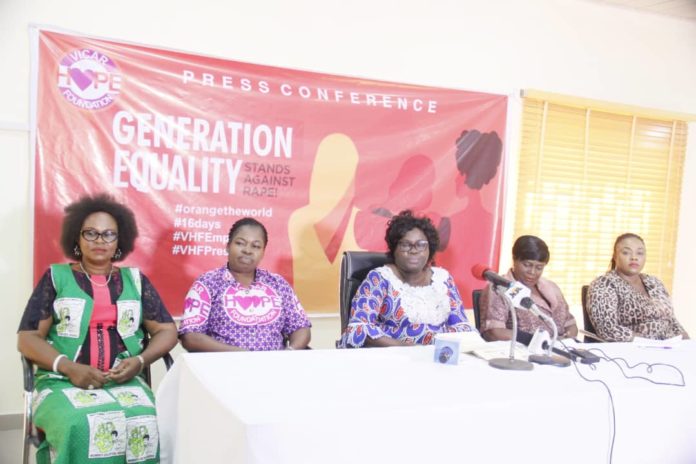FIC (Abia State) – Wife of the Governor of Abia State, Nkechi Ikpeazu, under the auspices of Vicar Hope Foundation and a coalition of Civil Society Organizations including National Council for Women Societies and International Federation of Women Lawyers addressed a World Press Conference to elicit the support of the media in the fight against gender-based violence.
The event which was held at Vicar Hope Foundation headquarters in Umuahia is in line with the 16 Days of Activism against Gender-Based Violence, an international campaign to challenge violence against women and girls with the theme for this year as Orange the World: Generation Equality Stands Against Rape.
Mrs. Ikpeazu said the media is vital in the effort to eliminate gender-based violence “The media needs to put out issues of Gender Based Violence in the public space so that it can be seen in the right perspective.
In addition, issues of Gender-Based Violence demands responsible reportage. The media needs to tell stories of abuse correctly, and appropriately,” she said.
Mrs. Ikpeazu said it is a sad reality, that on a daily basis, women and girls around the world are still experiencing harassment and violence of all forms and types and despite all the long years of chanting for gender equality, women and girls are still raped and battered, and girls are still mutilated and married off as children.
Violence against Women and girls is a problem of pandemic proportions,” says Ikpeazu “At least one out of every three women around the world has been beaten, coerced into sex or mutilated.”
 “I believe Gender-based violence is a phenomenon deeply rooted in gender inequality. Both men and women experience GBV, but with current statistics, it is obvious, that women and girls are the major victims. GBV is a violation of the fundamental human rights of women and girls. The forms of Violence against women and girls include rape, domestic violence, sexual harassment, female genital mutilation, dowry-related abuse, marriage by abduction, forced marriage, and child marriage.”
“I believe Gender-based violence is a phenomenon deeply rooted in gender inequality. Both men and women experience GBV, but with current statistics, it is obvious, that women and girls are the major victims. GBV is a violation of the fundamental human rights of women and girls. The forms of Violence against women and girls include rape, domestic violence, sexual harassment, female genital mutilation, dowry-related abuse, marriage by abduction, forced marriage, and child marriage.”
She added that violence against women, girls often impair their productivity, by reducing their contribution to the social, economic, and political development of their families and communities. She went ahead to emphasize that the psychological effect of GBV has continually left imprints on the minds of the victim making them live beneath their potentials.
Focusing on the theme of the year, Mrs. Ikpeazu said rape is rooted in a complex set of beliefs, power, and control that continue to create a social environment, in which sexual violence is pervasive and normalized. It is no longer news that in recent events, the cases of rape has been on the hike. It is no longer men raping women; they are now raping girls, even girls of a few months old.
154 countries have laws against sexual harassment, but even where these laws exist, women and girls from all walks of life, still face sexual harassment every day.
15 million adolescent girls worldwide have experienced forced sex at some point in their life and only 1% of these numbers have reached out for professional help.
“The reason women and girls are less likely to report sexual abuses are rejection, victim-blaming, and stigmatization.
In recent times, more survivors have tried to speak up, which has put this issue of sexual violence in the spotlight, but the question still remains, has speaking up solved the issue? It is obvious that we need to elevate and take our actions to the next level.
The Founder of Vicar Hope Foundation said the state legislature in response to the advocacy and encouragement from Vicar Hope Foundation and a coalition of civil society organization including National Council of Women Societies, International Federation of Women Lawyers is giving speedy passage to the Violence Against Persons Prohibition Bill which would widen the scope of legal frameworks that will enable a reduction in gender-based violence.
“Today I am happy that the proactive 7th Assembly is seriously working on the bill with a view to giving it a speedy passage. It is also pertinent to note that for several years’ efforts to pass the bill have been on snail speed until this coalition of civil society organizations came together, joined forces and met a willing House of Assembly that puts the people first.
I use this medium to appreciate the 7th Assembly, led by Right Honourable Engr. Chinedum Orji for responding to our call and moving swiftly in response to fill the need.”
16 days of Activism began from 25 November which is the International Day of the Elimination of Violence against Women and will end on 10th December which is the World Human Rights Day. Globally, every organization that operates in the human rights space, is undertaking one action or the other to highlight the period.






